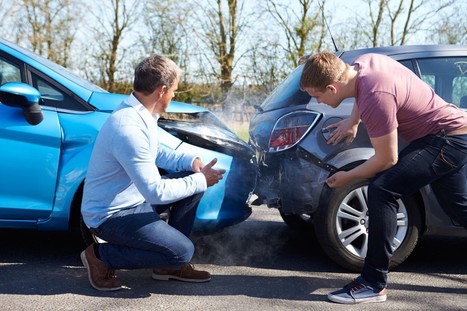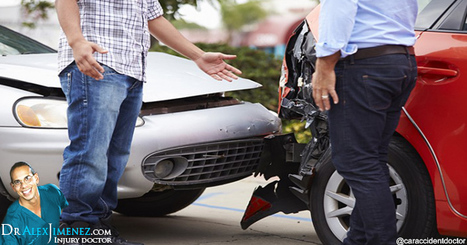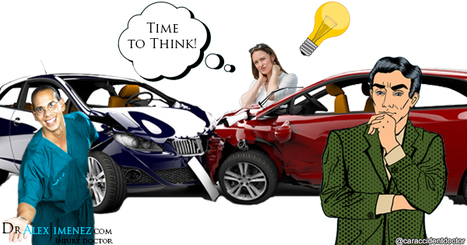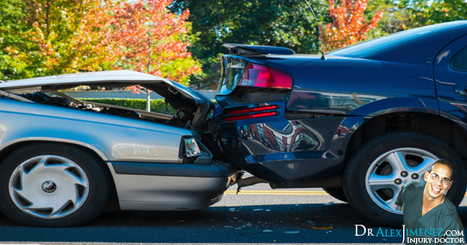 Your new post is loading...
 Your new post is loading...
It’s not always safe to assume the individual was left unharmed from an auto accident simply because there were no visible wounds or injuries. It’s crucial to seek immediate medical attention following a traumatic accident to properly diagnose any possible injuries or aggravated conditions which may have developed from the unexpected automobile accident. All too frequently, many automobile accident victims may be at risk of experiencing further injury as a result of not being alert of their surroundings. A sudden auto collision can cause confusion and disorientation, leaving those involved feeling unaware of the events happening around them. In this state, it is easy for another accident to occur. Further injury can take place from carelessly walking around the scene of the accident or during the unfortunate case where another vehicle crashes into the existing accident scene. It’s very important to seek immediate medical care after experiencing damage or injury from an auto collision in order to begin the healing process as soon as possible. The more an individual delays treatment for their injuries, the more challenging it can be for the body to heal itself naturally.
For those who’ve suffered a car accident, whiplash type injuries should be a very serious concern. Often times, the symptoms associated with a whiplash injury can develop several weeks or even months after the incident and it can be easy for an individual to believe there were no injuries as a result of the auto collision. Because of this, a majority of people don’t seek medical treatment following the car accident. Whiplash-associated injuries are among the most common neck injuries. Whiplash is caused by an abrupt movement of the head, either backward, forward, or sideways, which damages the supporting muscles, ligaments and other connective tissues in the neck and upper back. The term whiplash was initially utilized in 1928 to identify an injury mechanism of sudden hyperextension followed by an immediate hyperflexion of the neck, resulting in damaged muscles, tendons and ligaments, most specifically, those supporting the head. Presently, we understand that this type of injury doesn’t necessarily occur as a result of extension and flexion beyond its natural range, instead, whiplash injuries are known to occur from an extremely rapid extension and flexion of the neck in any direction. Because of their misunderstood, complex nature and the serious impact these could have on people’s lifestyles, only a limited amount of topics in the healthcare field have created as much controversy as whiplash injuries. In order to help the individual better comprehend the nature of whiplash-associated injuries and how these should be properly treated, it is necessary to invest some time discussing the mechanics of how whiplash injuries occur.
When an unexpected automobile accident occurs, it’s essential to seek immediate medical attention from a recommended car accident doctor and specialist to receive a spinal evaluation and diagnose for any possible injuries or conditions, including if the individual didn’t experience any symptoms after the incident. Because people are not readily prepared to deal with the legal processes involved during a car accident, many individuals settle their cases with the insurance companies before they’ve had a proper medical diagnosis from a healthcare professional trained in soft-tissue injuries. Moreover, once the individual has settled their case, they lose the right for care if indeed it was necessary. It’s in one’s best interest to get the attention they need to restore the original health of their body and ensure all its structures are functioning properly. If a recent automobile accident left those involved feeling merely sore, it is still important to check the overall health of the individual as soon as possible. Whiplash, for example, is a common neck injury caused by a sudden back-and-forth jolt of the head due to an external force and its symptoms may develop 2 to 3 months after the initial injury. In addition, a large number of people whose injuries remain undetected after suffering an auto accident, may also experience neck or low back pain, numbness, muscle stiffness, headaches, fatigue and other complications over time including arthritis. Not only are car accidents an inconvenience, many victims describe that they don’t feel like their normal selves following the events of the incident. The trauma from an injury or an aggravated condition may also cause irritability, memory loss, difficulty concentrating while awake and difficulty sleeping at night.
A majority of people choose to ignore their symptoms after the car accident, hoping these will resolve on their own over time. Occasionally, the damage or injury from the incident may be so mild, the pains and aches may actually resolve on their own over a period of time, but when the discomfort begins to worsen, it’s time for them to seek immediate medical attention to properly determine the source of their symptoms and develop a proper treatment plan for each individual. The sooner the individual receives a proper diagnosis and follows up with treatment, the sooner they will be able to return to their regular lifestyles without experiencing aches and pains as well as reduce the risk of future complications. After visiting a healthcare provider due to symptoms from a car accident, the individual will have their injuries examined, documented and filed. Common automobile injuries such as whiplash, can present symptoms immediately after the accident, but sometimes, the symptoms can begin days, weeks and even months after the incident. Whiplash is a neck injury which occurs when the head moves abruptly back-and-forth due to the force of an impact, stretching and occasionally tearing the complex structures surrounding the cervical spine. Common whiplash symptoms can include; pain in the neck, arm, back and shoulders which is usually accompanied by headaches and muscle spasms as well as neck stiffness or tenderness, difficulty focusing and dizziness. Other symptoms include nerve injury along with a pins and needles sensation.
The symptoms of whiplash generally occur immediately after the automobile accident, but occasionally, these can take several hours or even days to develop. If you have been involved in a car crash, it’s important to take prompt action in order to minimize the recovery time. According to research presented at the World Congress on Neck Pain in Los Angeles, the initial level of pain after a whiplash-related injury as well as psychological factors, such as having positive expectations for getting better, can best predict which individuals will recover quickly from whiplash. Most cases will resolve in a matter of a few days while others may take weeks or longer to heal. It’s always recommended to seek professional medical attention after experiencing pain and discomfort, but in the meantime, the individual can utilize home remedies to relieve their symptoms while they begin their recovery process.
The spine is a complex structure surrounded by muscles, tendons, ligaments and other types of tissues. Although it is designed to be strong enough to support the weight of the head and hold the upright posture of humans, the spine is not built to withstand the shock of an automobile accident. The impact strains the muscles and ligaments in the back and the facet joints frequently bear the brunt of the force. This can result in several types of injuries, including whiplash, fractures and disc herniation. Among all these injuries and conditions, sciatica is repeatedly diagnosed throughout many accident cases. Sciatica is best described as a set of symptoms rather than a single condition, characterized by radiating pain along the sciatic nerve, the largest single nerve in the human body. One of the most common causes of sciatica after an auto accident is a herniated disc. The vertebral discs in the spine primarily function as a shock absorber between each vertebra. The tough yet soft jelly-like structure of the discs acts as a form of cartilaginous joint or cushion to provide smooth mobility to the spine, also acting as ligaments to hold the vertebrae of the spine together. Because the discs can absorb the majority of the shock from any direct trauma to the spine, it is possible for a disc to herniate during a car crash.
The human spine is a complex structure consisting of bones, muscles, tendons, ligaments, nerves and other tissues. Spinal health is essential towards maintaining the body’s optimal performance as it functions to support an upright posture, provides flexibility to allow the body to bend and twist freely, and most importantly, it protects the spinal cord. While a healthy back can easily be taken for granted, a back injury or other type of complication may result in long-lasting consequences that could alter an individual’s aspect of daily life. Unfortunately, back injuries are among the most common types of complications suffered after an automobile accident. Each day, thousands of individuals are involved in head-on, side-impact, and rear-end auto collisions, often leading to spinal injuries even during minor car crashes. Depending on the force of the impact, a single or multiple areas of the back may be affected. Automobile injuries can range from mild sprains and bruises to fractured vertebrae and spinal cord damage. If you’ve had a car accident, it’s essential to take note of any symptoms of back pain, as there are a variety of spine complications which could result after experiencing an auto collision.
The shoulder has a wider range of motion than any other joint in the body. The rotator cuff consists of four muscles and tendons which merge together to surround and protect the shoulder joint. The rotator cuff attaches the humerus to the shoulder blade, mainly functioning to provide motion to the arm, allowing it to lift and rotate in a broad extent of motions. A tear is characterized when one of the four muscles and/or tendons around the shoulder joint become damaged or injured, usually from repetitive overuse of the shoulder, or in other cases, as a result of direct trauma from being involved in a forceful automobile accident. When a single or multiple of the rotator cuff tendons is torn, the tendon no longer fully attaches to the head of the humerus. Different types of tears may occur. A partial tear is identified as damage to the soft tissue where it hasn’t been completely severed. A full-thickness tear, also referred to as a complete tear, is identified when the soft tissue splits into two pieces. In a majority of cases, tendons may tear where they attach to the shoulder joint. With a full-thickness tear, there is essentially, a gap in the tendon. Rotator cuff tears are most often associated with rear-end collisions, however, any type of car accident can lead to shoulder injury. During an auto accident, many individuals tend to tense up and brace their hands against the steering wheel which causes the shoulders to absorb a large amount of the force from the impact. Rotator cuff tears are very likely to occur in this instance.
Sometimes the worst injuries are the invisible ones. Even a slower impact collision can result in serious whiplash that last for weeks, months, or years. Similarly, the most minor tweaks of the back can result in lasting pain for years. The accident does not need to be a traumatic rollover or a head-on collision; a severe back injury can result from a rear ender, of which there are 1.7 million rear end accidents each year, according to the Washington Post. As we all know, back injuries can occur from an afternoon of chopping wood, a game of touch football, or simply by sitting at a desk for too long. It is no wonder, then, that incredibly severe injuries occur regularly for victims of auto accidents. Often, the back injury may be overlooked, as other, more pressing injuries require medical attention first, such as broken bones, lacerations, or a traumatic brain injury. What began as a stabbing, acute pain can transform into chronic, lasting pain even if the patient is treated right away. This can result in a serious disability that hurts everything from home life to your work. If you have been injured in a car accident and have developed chronic or acute back pain, contact an experienced Cleveland, Ohio, car accident attorney at once for legal guidance. Short-Term Acute Back Pain Back pain that lasts less than three months or up to half a year can be described as acute back pain, according to Spine Health. It is directly caused by tissue damage (muscles or ligaments) and the symptoms include stabbing pain, aches, stiffness, decreased range of motion, and difficulty standing up as straight as you once did. The lower back is more susceptible to injury and acute pain than the upper back, and is the second most likely reason that Americans see their doctor. It is important to take care of acute back pain as soon as possible, because the longer it lasts, the more likely it will develop into chronic pain. Not only does long-lasting acute pain ruin a person’s mood and attitude towards their injury, it also increases the neurological pain signals even when the tissue damage is no longer present. Long-Term Chronic Back Pain The two types of chronic back are identifiable and non-identifiable pain sources. The first, identifiable, results from muscle, ligament, or spinal disc damage. A herniated disc, loss of disc fluid, or spinal stenosis all cause pain by putting extra pressure on the spinal cord. Spinal decompression surgery may offer relief for patients suffering from these types of spinal compression injuries. The second type of chronic back pain stems from no identifiable generator. This chronic “benign” back pain is caused by a neurological pain pathway that was created when the original injury occurred, and has lasted when the tissue or disc damage went away or was repaired. Now, the pain is the problem itself, not the injury, which can be incredibly frustrating for those seeking a cure. If your back has been injured in an auto crash, contact one of our Cleveland, Ohio car accident attorneys of the Chester Law Group Co. LPA today. The post Chronic and Acute Back Pain From a Car Crash appeared first on Chester Law Group.
Via Chester Law Group
A Canadian study found that a considerable percentage of individuals who’ve been injured in these types of car crashes may eventually develop a form of chronic pain. The research was conducted at the University of Alberta where 268 people who had suffered a grade 1 or 2 neck injury as a result of an automobile accident were evaluated. These were the least severe types of injuries as the scale also consists of grade 3 and 4. Each individual was examined at 3 months, 6 months, and at 1 year after the time of the accident. Additionally, the individuals were specifically asked the question, “Do you feel that you have recovered from your injuries?” The end results of the study revealed that 3 months post-injury, about 38% of individuals reported pain and other symptoms. Then, 6 months post-injury results revealed that about 22% of individuals reported pain and other symptoms. Finally, the end results of the study revealed that 1 year post-injury, about 18% of individuals still reported pain and other symptoms. The results confirmed what previous research had found. A British research paper from 2009 described that as many as 5% of individuals may be permanently disabled from an auto collision and that a considerable amount of more than 5% of individuals may experience painful symptoms even 10 years or more after the initial injury. If you’ve been involved in an automobile accident and experienced an injury that is causing you symptoms of pain and discomfort, it’s essential to seek immediate medical attention to diagnose a possible injury or aggravated condition after the collision. Early treatment can be the key to preventing chronic symptoms from developing in the first place.
Research conducted by the University of North Carolina, Department of Anesthesiology has indicated that weight differences among individuals who’ve been involved in an automobile accident can ultimately affect the recovery rate of auto injuries. The research determined that losing weight may be a necessary means towards not only improving an individual’s overall health but also, reducing the risk of possible injuries during a future automobile accident. The study involved 1,000 adults whom had checked into an emergency department within 24 hours after a car collision. Overall, 37% of individuals were characterized as normal weight, 32% of individuals were characterized as overweight, 18% of individuals were characterized as obese, and 13% of individuals were characterized as morbidly obese. Each individual rated their injury symptom levels on a scale of 0 to 10, mainly describing pain and discomfort on their neck, shoulders, and back. Individual assessments were conducted at the end of the study as well as six months and a year later. The researchers at the Department of Anesthesiology of the University of North Carolina discovered that the more weight an individual carried, the more likely they were to report pain and other symptoms. Conclusively, maintaining a healthy weight and/or weight loss is fundamental for achieving overall health, fitness, and wellness, as well as to prevent complications and improve the recovery rate of injuries after an automobile accident.
A study published in the journal BMC Public Health found that only 44% of individuals suffering from whiplash had returned to work after two years as compared to 57% of individuals with other musculoskeletal injuries. Approximately 19-60% of individuals with whiplash-associated disorders still experience symptoms six months after the injury, and up to half of that percentage will fail to return to work within a year due to their symptoms. Researchers from Denmark conducted a study to determine whether the high rates of continuous and consistent symptoms actually affected the return-to-work rates of individuals with whiplash type injuries. By the end of the study, 56% of individuals with whiplash injuries were still on sick leave after two years. The results for this study proved to be much higher compared to the results found in earlier studies. For example, a study conducted in 2001 demonstrated that only 12% of individuals with whiplash-associated disorders hadn’t returned to their normal activities or they had resumed back only to modified job functions a year after their initial injuries. Regardless, both research studies showed that for individuals with chronic symptoms of whiplash, the chance of long-term work disability was greater. Active rehabilitation, such as chiropractic treatment, physical therapy, and exercise can promote an individual’s recovery as well as ensure they can return quickly to their regular lifestyles and work responsibilities.
The new study found that approximately 25.7% of individuals with whiplash injuries also experienced post traumatic stress disorder which adversely influenced their physical symptoms. Prior studies had suggested that PTSD and hypersensitivity to pain could ultimately increase the risk for an individual to develop chronic whiplash symptoms. A study conducted by Ashley Pedler and Michele Sterling of the University of Queensland in Australia was utilized to determine whether individuals with whiplash and hypersensitivity could be categorized according to their symptoms. The study involved 331 patients who had experienced a whiplash injury approximately within 3 months from the automobile accident. Each patient was evaluated for neck pain, disability, cervical range of motion, mental health, and PTSD as well as hypersensitivity.
|
Chiropractic care is an effective, alternative treatment option for a variety of injuries or conditions surrounding the spine and its many structures and it can be used to relieve symptoms induced by whiplash as well as treat injuries to the extremities. When an individual has suffered an injury as a result of an automobile accident, a personal injury chiropractor can positively influence the proper progress of their rehabilitation, helping the individual obtain the fair compensation they need and deserve for their auto injuries. An experienced and well-trained personal injury chiropractor can provide quality treatment as well as support patients throughout their injury claim procedures. There are many qualified providers in the El Paso, Texas area, however, several important factors should be individually considered before choosing a personal injury chiropractor to make sure you’re choosing the most appropriate healthcare provider for your specific type of injuries and claims. Foremost, when seeking medical care from a specialized chiropractor after suffering an auto injury, it’s crucial to verify whether the professional has had previous experience with automobile accident and personal injury claims. It may also be important if the personal injury chiropractor the individual has considered getting treatment from has attended post graduate training in accident injury evaluation and treatment which can guarantee a much more effective diagnosis and care from them.
The neck is a complex structure composed of vertebral bones, joints, discs, muscles, tendons, ligaments, blood vessels, nerves and other tissues. During an auto accident, the force from the impact will act against the body, frequently causing the head to jolt abruptly back-and-forth in any given direction, otherwise known as whiplash. Individuals who were solely involved in rear-end impacts face up to a 50 percent chance of suffering from car accident whiplash injuries, and of those injured, there is also the risk they will develop further complications, such as chronic pain symptoms and/or degenerative conditions. Roughly half of all people with chronic neck pain can associate their issues to a prior car accident. Whiplash can damage or injure the structures located around the cervical spine. The sudden motion of the neck stretches the surrounding tissues causing spinal misalignments, or subluxations, muscle, tendon and ligament strains and tears as well as pinched nerves and spinal degeneration over a period of time.
Since I started my series about Medicine and the Law, I’ve been thinking a lot about a debate I used to have with my friends when I was younger. Some of my friends wanted to be lawyers, others wanted to be doctors. At that time, doctors were paid more than lawyers. Since that time, lawyers are paid more than doctors.
At the heart of this debate were a few simple questions:
Who works harder, doctors or lawyers?
Who should get paid more?
Whose job is most important?
I’ve always felt that doctors worked harder than lawyers. That medicine is a profession with no restrictions to work hours and that law is a corporate type of job with restrictions. I understand that in every profession there are difficult and less difficult specialties. Radiologists, physiatrists, and dermatologists are all doctors but they definitely don’t work as hard or as long of hours as surgeons, traumatologists, or intensivists. Similarly, litigators are under a lot of stress and must work after hours to prepare for cases. If clients get in trouble after hours, they must attend to them. On the other hand, there are contract lawyers that review contracts and don’t spend time in front of judges or juries. So in both professions there are those that work hard and long hours.
One key difference for me is that doctors are responsible for care at all hours of the day and night. If your doctor doesn’t see you when you need him/her you can die and bad things can happen. If your lawyer doesn’t see you, perhaps something bad can/will happen, but you can always get another attorney or if you get in trouble one will be assigned to you.
I guess both doctors and lawyers must take their work home at night. But when you are a doctor and someone is in the hospital, you must field calls from nurses all night. Lawyers don’t really have the same sort of torture and can sleep.
I definitely feel that doctors have more important jobs than lawyers. I know I am biased and that many of you will probably be upset and disagree, but the truth is that all across the world you can live without a lawyer, but you can’t live without doctors.
So who should get paid more? Well, in most other countries outside the U.S. doctors do not make much money. They probably get more respect but don’t get paid as much. I still feel that doctors should get paid more than lawyers, but the payment mechanism of this country continues to punish physicians. But this is for several reasons including the inability of the government to pay for the aging population, the rising costs of healthcare, and the sheer necessity of providing care to everyone in need. Perhaps those facts reveal that medicine is more important than law — those that cannot afford lawyers simply don’t get them and they do fine. But people need doctors to stay healthy and doctors but there are too many people that need doctors and it is too expensive for the government to pay for them all.
One final note is that I think it is interesting that the payment mechanism in law has not changed. Lawyers continue to get paid exorbitant hourly wages. The more senior attorney you are the higher your hourly rate. Lawyers get paid more for longer cases or more complicated ones. And most importantly, there is no incentive for lawyers to make things short and sweet — doing so decreases their billable hours.
But doctors have an incentive to work fast. They don’t get paid hourly. In fact, when they spend more time with someone it reduces their economic productivity.
I don’t need to spell out how to change this system. Anyone with a pea of a brain could figure out how to incentivize physicians to work more effectively.
Hopefully none of my lawyer friends are reading this!
Should I Get a Chiropractic Adjustment After My Car Accident?
A car accident is the last thing anyone needs. Between all of life’s other daily struggles, adding a car accident into the mix just creates more stress and more things to think about. On top of that, car accident injuries can create an added strain on your life, forcing you to take time off work or even making you unable to do certain tasks. One of the biggest questions after a car accident is where to seek treatment for those injuries. Here’s when and why you should consider a chiropractic adjustment after a car accident:
Was the car accident extensive?
Most people will agree to go to the hospital after an extensive car accidents, and rightly so. Any time a head injury is involved, or there is a chance for internal bleeding, getting emergency medical care is important.
But what most people don’t realize after an accident is that even minor car accidents can lead to soft tissue injuries, and if untreated they can lead to chronic arthritic issues. When the vehicle doesn’t absorb the full shock of the crash, the occupants do–so any time your body is jerked in response to a collision, the possibility of injury is there. It’s a misconception that only high-impact collisions cause accidents. In reality, even minor fender benders can lead to injury and more than half of all whiplash injuries occur in crashes where there was little to no damage to the vehicle. The only way to rule out injuries is to seek medical attention.
Are you in pain?
Pain after a car accident is a good indication of an injury. If there’s any chance that severe or life threatening injuries are involved, you should first go to an emergency room to rule those out.
Even if you’re experiencing no pain, it’s still a good idea to see a chiropractor after your car accident. Many car accident injuries don’t cause pain or discomfort until weeks or months later. After that time has passed, and if you still have not sought treatment, you may be forfeiting your right to insurance coverage for your injuries. The best rule of thumb to keep your health and your finances protected is to play it safe and get checked out by a chiropractor within 2 weeks following your car accident.
Have you seen a specialist?
Going to the hospital or your primary care physician is a great way to protect your insurance rights, but it doesn’t mean injuries can’t be overlooked. If the hospital clears you of serious / life threatening injuries, but you’re still experiencing pain, seeing a chiropractor should be your next step. Hospitals are great at identifying serious or life threatening injuries, fractures, broken bones, concussions, and all of the more obvious signs of injury after an accident. But if you leave the hospital with a clean bill of health even though you’re still experiencing pain, it can’t hurt to get a second opinion.
If you’ve been in a car accident, you need to be assessed by a doctor who is familiar with car accident injuries and treats them every day. Car accident injuries can be hidden, not revealing pain or limited mobility until months or even years later. Chiropractors are trained to detect these hidden injuries. They can perform orthopedic and neurological tests to assess soft tissue damage, structural damage, muscle strength, range of motion, joint and nerve function–signs of injury that other medical practitioners (despite their good intentions) may miss.
If any injuries revealed after this assessment, your chiropractor will plan out a care plan, personalized to you and your specific injuries. This care plan may include a schedule of chiropractic adjustments and sometimes deep tissue massages or trigger point therapy. Your chiropractor will use these chiropractic adjustments to restore health to your spine and surrounding muscles and tissue. After a car accident, there may be herniated discs, subluxations, strained tissues and more–a series of adjustments can straighten these issues out so that you’ll return to having full mobility and being free of pain.
Post-traumatic stress disorder, also referred to as PTSD, is a psychological or mental health condition that develops in people who have experienced a traumatic, horrifying event. PTSD is primarily associated with soldiers returning from combat, although, this emotional ailment is not limited to military combat situations. As a matter of fact, automobile accidents are one of the leading causes of post-traumatic stress disorder nationwide. For most people involved in an auto collision, the feelings of shock and fear may be difficult to deal with at first, but with time, patience, and plenty of self-care, their emotional health will generally restore on its own. But, if the symptoms worsen or they last for months or even years without improvement and these begin to interfere with the individual’s everyday functioning, they could have developed PTSD. The most difficult feature about identifying PTSD, and therefore treating it, involves the numerous, different ways the condition may arise for each person. While several people can experience the effects of post-traumatic stress disorder as bad dreams or nightmares, other can experience them as anxiety in crowded places.
Whiplash occurs when the muscles and ligaments of the neck stretch further than their average range of motion. While symptoms of neck injury may not occur instantly, it’s essential to keep a close watch over any physical changes which may result following the accident and seek medical attention as soon as possible to properly diagnose the presence of any other spinal complications. Although whiplash is considered a relatively mild condition, it can cause long-term pain and discomfort. During an auto collision, the sudden force of the impact causes an individual’s head to abruptly move back-and-forth in any direction, depending on the type of car crash. The rapid flexion and extension of the neck pulls and extends the muscles, straining the soft tissues around the cervical spine, occasionally causing them to tear. After several years of research, it’s evident that the spinal ligaments can be stretched and/or torn during an automobile accident. Prior research has shown that the anterior longitudinal ligaments, the transverse ligaments, and the facet capsules, found within the neck, can be damaged or injured even in minor crashes.
Whiplash and other type of neck injuries can occur from any type of auto accident, especially a rear-end collision. During the abrupt and forceful movement from a car crash, the body goes through an extremely rapid and intense acceleration and deceleration where the individual’s head can move back-and-forth very suddenly and with great force in any direction. As a result, the soft tissues of the neck extend beyond their normal range of motion, damaging and injuring the various structures surrounding the cervical spine. Symptoms of whiplash generally appear within 24 hours following the incident, however, sometimes the symptoms may develop after a few days, weeks, or even months after the automobile accident. Many individuals believe they are not as injured as they really are, that’s why it’s always essential to seek immediate medical attention after being involved in an auto accident in order to determine the presence of an injury or detect the early development of a much serious medical condition. The most commonly reported symptoms of whiplash include neck pain and discomfort, accompanied by stiffness, headaches, especially at the base of the skull, dizziness, blurred vision and constant fatigue. Other, less common symptoms associated with chronic whiplash include, chronic pain on the neck, shoulder or head, difficulty concentrating or retaining memory, irritability, ringing in the ears and/or inability to get a good night’s rest.
Automobile accidents are often unpredictable circumstances which can involve many complications. Whether it’s a minor or severe collision, many individuals are forced to deal with all the implications that come after being involved in an auto accident on their own, a frustrating process that frequently ends with victims being on the losing end of their benefits. Injured and without a car, approaching the best course of action following an auto accident doesn’t need to be a difficult circumstance and we know the best procedures to help you recover from your situation. According to the National Highway Traffic Safety Administration (NHTSA), approximately 2.6 million individuals are injured each year in automobile accidents, accounting for 95 percent of all injury causing accidents on the roads. During a car crash, the sudden force of the impact can commonly cause subluxations or spinal misalignments in the body, a condition where the complex structures surrounding the spine are affected, distorting the normal alignment of the vertebra, irritating nerves, ligaments, and discs, overall affecting their natural function and your health.
Automobile accidents are one of the principal causes of spine complications and are responsible for more than 40 percent of spinal injuries every year, according to the Mayo Clinic. While the best possible precautions can be taken to avoid tissue damage or injury in the case of an auto collision, car accidents can be unpredictable and may not always be prevented, but knowing the right information can help an individual recognize a possible injury as well as be aware of the next steps to take for recovery. The spine is a complex structure consisting of bone, muscle, tendons, ligaments, blood vessels and nerves. Although its capable of supporting the whole weight of your body in order to promote a proper balance, the spine can also be considered to be a delicate structure. The spine is not built to withstand the impact of a car accident and unfortunately, neck and back injuries are common during car accidents. The force of the impact causes strain on the ligaments and muscles in the back, and the facet joints endure the majority of the brunt from the collision. This can lead to several injuries including, whiplash, disc herniation, compression fractures, and spondylolisthesis.
A research conducted from the University of Alberta demonstrated that consistent recording of an individual’s pain and discomfort in a journal may actually slow down their recovery from whiplash-associated disorders. The research involved 60 individuals diagnosed with acute whiplash injuries. Each individual was randomly designated to one of two separate groups: a symptom diary group or a control group. The individuals from the symptom diary group were asked to manage a journal rating their overall levels of pain for each day. Additionally, individuals from both groups received physical therapy for their whiplash-type injuries. After three months of treatment, the individuals were evaluated for recovery. Overall, 59% of the individuals within the symptom diary group reported recovery as compared to 86% of the individuals within the control group. The author of the study, Robert Ferrari, concluded that not only was using a pain diary unfavorable towards recovery but its use might actually be more harmful for the individual. Ferrari explained that keeping a pain diary could make an individual more aware of their symptoms, leading to incorrect perceptions of prognosis. Negative attitudes have before been linked to chronic pain symptoms in individuals with whiplash-type injuries and low back pain. “While diaries may serve a useful purpose to facilitate practitioner-patient communication about symptoms and to track the course of symptoms, the benefits have not been demonstrated”, Ferrari wrote.
Research has discovered that individuals with whiplash-type injuries may share various characteristics of those with Achilles tendonosis, offering further insight into possible new treatment options for chronic whiplash symptoms. The study analyzed the tendons of individuals with whiplash-associated disorders and found signs of pathological neovascularization, or the development of blood vessels in abnormal tissues, comparable to what has been found in individuals with Achilles tendonosis. The research conducted to examine the symptoms of chronic pain in the Achilles and patellar tendons demonstrated the presence of high blood flow in the more painful areas of the tendons. Additionally, later studies revealed that these particularly painful tendons showed the characteristic similarity of blood vessel growth in abnormal tissues. Through the study, researchers also determined that injections of anesthetics into these vessels could provide temporary symptom relief. The researchers from Umea University in Sweden utilized the same imaging techniques used in the Achilles tendonosis studies to determine changes in the tendons of individuals who suffered from whiplash injuries during auto collisions. Individuals with whiplash showed more areas with high blood flow, and the blood flow was intensified at each examined region. Areas of high blood flow were evident where the tendons entered into the bone. In the study, women with whiplash were more likely to have more areas of high blood flow than men, evidence that may suggest why there’s higher rates of whiplash injuries in women.
For individuals who’ve been involved in an automobile accident, the symptoms of neck and back pain resulting from an injury can be disabling. The greatest issue with neck and back pain caused during an auto collision involves the continuous cycle of the body when it reacts to injury. Due to the traumatic nature of the accident, the damage or injury to the spine most often causes a chemical response to trigger, leading to symptoms of pain, inflammation, and swelling, well-known signs that unfortunately don’t resolve quickly. Many chiropractors commonly diagnose and treat neck and back complications affecting individuals after being involved in an auto accident. After suffering an injury, it’s important to seek immediate medical attention to begin treatment for your injuries. When the body experiences trauma from an injury, its normal for the body to produce inflammatory chemicals that cause the region surrounding the tissue damage to become inflamed and swollen but if the individual doesn’t receive medical treatment, the chemical process will continue, causing worse symptoms to develop. In addition to chiropractic care, applying ice therapy to the area of the injury and staying active can help improve the symptoms of the injury. Using ice can help temporarily reduce the inflammation on the muscle tissues and it also offers relief from the pain. Walking, for example, is a simple physical activity that can help stimulate the body to produce natural pain killers as well as help maintain the body’s flexibility. A chiropractor can easily diagnose the source of your neck and back pain to decide which spinal adjustments, exercises, and stretches will be the best option for your type of injury and level of symptoms in order to speed up the healing process and promote the best recovery.
|



 Your new post is loading...
Your new post is loading...

































After an individual has been involved in a car accident, it’s absolutely essential for the driver and any passengers to determine if they experienced any injuries from the incident. Various types of injuries can result from an auto collision and there are types of injuries which may not be noticeable immediately and other others may be necessary to take. For more information, click the post for attorney.